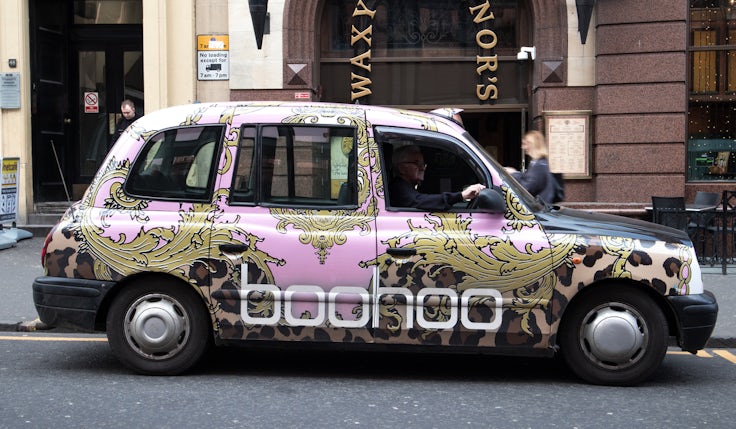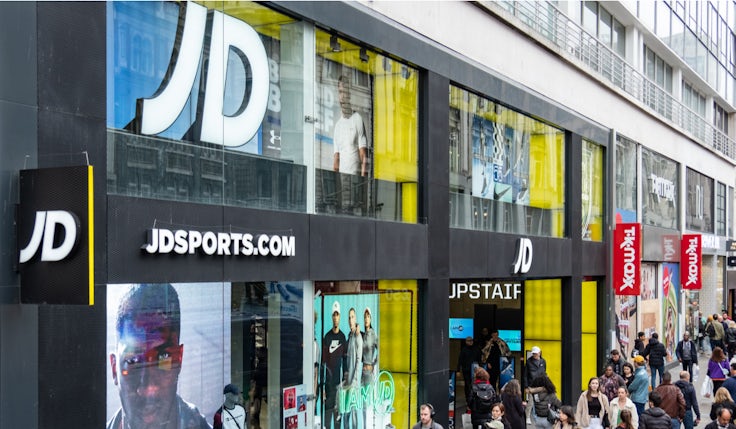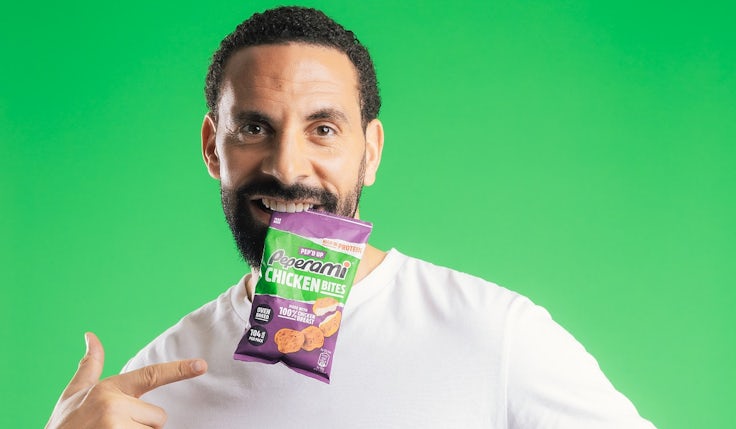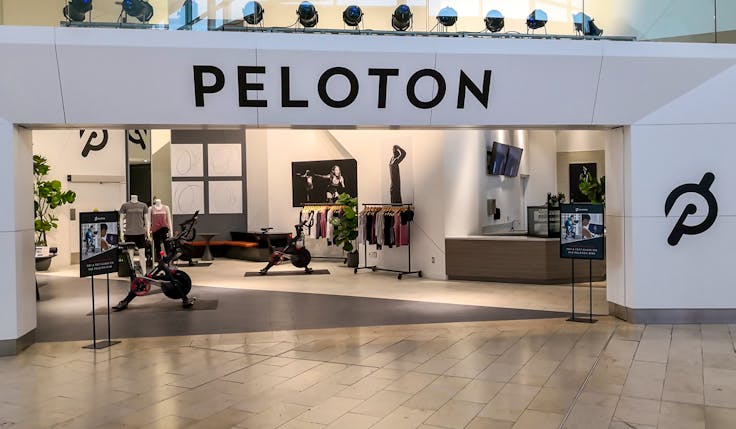Peloton, McDonald’s, H&M: Everything that matters this morning
Good morning and welcome to Marketing Week’s round-up of the news that matters in the marketing world today.
Peloton axes Mr Big ad after sexual assault allegations against star
Peloton has pulled its ad starring Mr Big actor Chris Noth after sexual assault allegations were revealed.
The fitness brand cashed in on using the star after a scene in the new Sex and the City spin-off showed Mr Big suffering a fatal heart attack after a ride on a Peloton bike.
The brand was unaware its product was going to be used to kill off the character, but quickly turned around negative sentiment (its shares fell by more than 16% after the episode aired) by resurrecting Mr Big for an ad in which he stars alongside real-life Peloton instructor Jess King.
The two talk about the fact life is too short not to “take another ride”, before Ryan Reynolds – whose agency Maximum Effort Marketing created the film – tells viewers about the virtues of regular bike riding. Namely that it improves the heart, lungs and circulation, lowering the risk of cardiovascular disease.
But the allegations of sexual assault against two women published by the Hollywood Reporter on Thursday have resulted in Peloton taking the decision to pull the advert.
“Every single sexual assault accusation must be taken seriously,” Peloton said in a statement, adding it was “unaware of these allegations when we featured Chris Noth in our response to HBO’s reboot”.
Noth told Bloomberg the allegations are “categorically false.”
“No always means no – that is a line I did not cross,” he said. “The encounters were consensual. It’s difficult not to question the timing of these stories coming out. I don’t know for certain why they are surfacing now, but I do know this: I did not assault these women.”
READ MORE: Peloton Pulls Its Chris Noth Ad After Assault Allegations Report
McDonald’s former CEO Steve Easterbrook to repay $105m in settlement
Steve Easterbrook, the former CEO of McDonald’s, has been ordered to pay back more than $105m (£79m), after the company said he lied about three sexual relationships with staff.
Easterbook, a former marketer, was forced to step down from his role in November 2019 after a consensual relationship with an employee was deemed by the fast food chain to violate company policy. McDonald’s said at the time Easterbrook had shown “poor judgement” and initially gave him $105m in severance.
However, following further investigation two additional relationships were discovered, which McDonald’s said if it had been aware of would have meant it wouldn’t have approved the multimillion dollar pay-off.
“This settlement holds Steve Easterbrook accountable for his clear misconduct, including the way in which he exploited his position as CEO,” McDonald’s chairman Enrique Hernandez Jr said.
“Today’s resolution avoids a protracted court process and moves us beyond a chapter that belongs in our past.”
READ MORE: Ex-McDonald’s boss to repay $105m over staff relationships
Boohoo issues profit warning as returns increase
 Boohoo says its profit is likely to be impacted after seeing a surge in customers returning partywear in response to rising concerns around Omicron.
Boohoo says its profit is likely to be impacted after seeing a surge in customers returning partywear in response to rising concerns around Omicron.
The fast fashion retailer had sold an “exceptionally high” number of dresses in the quarter up until November, but many are now being returned as people’s plans change.
This is particularly the case when it comes to more expensive brands such as Karen Millen and Coast, which Boohoo acquired in 2019.
Overseas delivery delays are also causing issues for the online retailer, while higher shipping costs are expected to dent profits too, it says.
As a result, Boohoo expects earnings to increase by 6-7% in the year to February, rather than the 9-9.5% it outlined in previous forecasts.
Following the warning, Boohoo shares dropped by 15%.
READ MORE: Boohoo says surge in dress returns set to hit profits
H&M teams up with Danone to turn plastic waste into clothing
H&M has collaborated with Danone Aqua to transform old plastic bottles from across the islands of Indonesia into recycled polyester.
This is the second time the two brands have worked together on the bottle2fashion project, with more than 7.5 million PET bottles collected and recycled this time around – double last year. The bottles are sorted and cleaned before being shredded into flakes and made into recycled polyester fibres.
The recycled polyester is being used in H&M’s kidswear collection, featuring hoodies, trousers, joggers, T-shirts, tops and socks. It was made from more than 660,000 PET bottles.
The project also supports the Indonesian government’s initiative against marine pollution and contributes to its sustainable development goals.
Karin Brinck, sustainability manager at H&M Kidswear, says: “We want to lead the change towards a more sustainable fashion future. We can and have to create these collaborations to accelerate the transformation that is crucial for our industry – together with other brands, our suppliers and our customers.”
Harrods starts Boxing Day sale 10 days early
Harrods is starting is Boxing Day sale today – 10 days earlier than normal – as high street footfall continues to be severely impacted by the pandemic.
While the rise of the Omicron variant is keeping shoppers away, the upmarket retailer says the early start to the sale is not linked to the outbreak specifically.
It is only the second time in Harrods’ 172-year history that it has brought the sale forward.
Shopper numbers in the UK were 1.1% lower in the week to 11 December than the previous seven days, according to data from Springboard, driven by a 2.7% drop in visits to high street shops.
Michael Ward, managing director at Harrods, says it made the decision in response to “the changing needs of our customers”.
READ MORE: Harrods Boxing Day sale to start 10 days early as omicron bites
Thursday, 16 December

M&S takes Aldi to court over alleged copycat festive gin
Marks & Spencer is suing supermarket rival Aldi over an alleged copyright infringement of its gold-flake gin infusions.
According to legal papers filed on 3 December seen by the Financial Times, M&S claims that since November Aldi has been selling The Infusionist range of gins in clementine and blackberry flavours, using bottle designs that “copy” the M&S Light-Up Gin. Marks & Spencer is said to have registered designs for three varieties of the gin earlier this year.
The Aldi Infusionist range, which undercuts the M&S product by £6, shares the same bell-shaped bottle design, contains edible golden flakes and is illuminated from below.
The legal documents state that the Aldi gin “constitute designs which do not produce on the informed user a different overall impression to the [M&S] designs”. The M&S lawyers also reference press articles comparing the two products and highlighting the difference in price, as well as social media posts from the general public.
M&S reportedly wants Aldi to “surrender or destroy its stock and pay damages plus costs”, however the discount chain has already refused to stop selling the gin range.
According to the Financial Times, M&S claims to be one of the first retailers to bring glitter gin globes to the UK and as a result understands “the true value and cost of innovation”. The retailer says it wants to “protect” its reputation for freshness, quality, innovation and value, as well as protecting customers from “obvious copies.”
This is not the first time M&S has taken Aldi to court this year. In April, the retailer claimed its German rival had infringed a trademark on its Colin the Caterpillar Cake with its own version, Cuthbert.
Aldi, however, spun the story to its advantage with the social media campaign #freecuthbert, which caused the supermarket to trend at number one on Twitter and achieve organic reach equivalent to more than £5m worth of media spend.
Winner of the 2021 Marketing Week Masters award for Social Media, Aldi went on to launch a limited-edition Cuthbert cake with all profits going to Teenage Cancer Trust, encouraging other supermarkets to join its #CaterpillarsForCancer campaign.
READ MORE: M&S sues discounter Aldi over ‘copycat’ Christmas gin (£)
Instagram global vice-president of marketing steps down
 Instagram’s global vice-president of marketing Melissa Waters is departing after a year and a half to pursue an opportunity “outside Meta”.
Instagram’s global vice-president of marketing Melissa Waters is departing after a year and a half to pursue an opportunity “outside Meta”.
Waters joined the social media platform in June 2020 from her role as CMO at US telehealth company Him & Hers. Prior to that she served for more than two years as vice-president of marketing at ride hailing firm Lyft, a job preceded by over four years at music discovery platform Pandora. Waters has also held marketing roles at Cisco, Diamond Foods and The Home Depot.
In a post on LinkedIn, the Instagram marketing boss thanked her team for being “catalysts of impact”, adding: “While our time was shorter than I planned for – sometimes an opportunity calls that’s worth saying yes to (more on that later) – I am wildly proud of this chapter.”
Waters also called out the work her team had done over the past 18 months to establish the foundations of brand strategy, architecture and identity, developing the global brand platform ‘Yours to Make’ which is running across six markets.
She added that her team had introduced “hundreds of features across product marketing”, establishing new functions and focus areas, as well as launching “new types of marketing work” to keep Instagram pushing forward.
Over her year in the role Waters also recruited several marketers into the Instagram team, filling roles in product marketing, brand strategy, culture, community and integrated marketing.
Google threatens to sack employees who refuse vaccination
Google is set to fire employees who refuse to be vaccinated, suggesting in an internal memo they could be placed on unpaid leave and later sacked.
According to the memo, seen by CNBC, Google employees had until 3 December to send the company proof of vaccination or to apply for an exemption on medical or religious grounds. Those employees who cannot prove their vaccination status by 18 January will be put on paid leave for 30 days, followed by unpaid leave for up to six months, after which they will be sacked.
In a statement to the BBC, the search giant described its vaccination policy as one of the most important means to keep the workforce safe and maintain services.
The statement added: “We’re committed to doing everything possible to help our employees who can get vaccinated do so and firmly stand behind our vaccination policy.”
Google has been one of the big tech brands pushing for employees to return to the office. In April, the company announced it expected staff to be in the office for at least three days a week, although they would be able to apply to work remotely overseas for more than 14 days a year.
Then in July, chief executive Sundar Pichai confirmed that anyone coming to work in the office would need to be vaccinated.
READ MORE: Google will fire employees who refuse vaccinations, report says
Apple delays office return amid Omicron surge
Apple has delayed a return to offices amid surging cases of the Omicron variant, pausing plans for a hybrid work pilot originally set to kick off on 1 February.
CEO Tim Cook told US employees in an email that the office return date is “yet to be determined”, Verge reports, but all employees will be given $1,000 (£750) for their “work-from-home needs”. This amount of money is extended to Apple’s retail workers.
Yesterday the brand closed stores in Miami and Maryland in the US and Ontario in Canada, after a rise in Covid cases. Employees will be required to take Covid tests prior to the three stores reopening. Earlier this week Apple reintroduced mandatory mask wearing in stores and told staff to limit the number of customers inside at any one time.
Back in June the tech giant announced its desire for employees to return to offices by September, working at least three days a week from headquarters. Cook said in a memo at the time that some staff would be given the option to work remotely the remaining two days, but teams required for “in-person” work would need to be in the office four or five days a week.
At the time Apple also suggested employees could apply to work remotely for two weeks a year, a request that would need to be approved by managers.
Cook claimed in the June memo that despite all that had been achieved while working remotely “something essential” is missing: “Video conference calling has narrowed the distance between us, to be sure, but there are things it simply cannot replicate.”
The push to return to offices received a fierce backlash from Apple workers, however, who claimed the tech giant’s lack of flexibility had already forced some colleagues to quit.
In a letter, the Apple employees pointed to a “disconnect” between the staff and the management over remote working, stating that people were having to choose between their families, their wellbeing and being part of the company.
READ MORE: Apple delays full office reopening and is giving every employee a $1,000 bonus
Ebay supports small business with shoppable outdoor campaign

Ebay is looking to raise awareness of the 300,000 small businesses on its platform with the rollout of a nationwide shoppable digital out-of-home campaign.
The ‘Small Business Shopfronts’ campaign, developed with McCann London, features five of Ebay UK’s Small Business Award winners, each given an interactive out-of-home storefront shoppable via a QR code on the display.
The five brands – Botanico, Brown & Ginger, Bosede Accessories, Go Thrift and St Rocco’s Hospice – will see their creative exhibited on a range of large-scale digital sites in London, Birmingham and Manchester. Intended to bring mass reach to small businesses, the creative has been designed to highlight one-off finds from the small businesses selling on the Ebay marketplace.
UK CMO Eve Williams says that amid ongoing supply chain uncertainty, the Ebay platform offers shoppers the diversity of more than 300,000 agile UK small businesses.
“We know our customers want to do their bit to support small businesses and we’re proud to bring small business power to the forefront of consumer’s minds this year through the creation of these shoppable OOH windows,” Williams adds.
Wednesday, 15 December
 Over half of consumers try to shop locally after pandemic impact
Over half of consumers try to shop locally after pandemic impact
More than half (58%) of UK shoppers are increasingly more interested in supporting local businesses when making purchasing decisions.
This is according to a survey from the Data & Marketing Association (DMA), which also finds interest in shopping local is prevalent particularly in the over 65s (67%).
Respondents state a variety of reasons driving local shopping, such as supporting the local economy (36%), convenience (21%) and sustainability (13%).
Shoppers have been shopping locally throughout 2021 even when restrictions were lifted. The DMA says this is possibly due to positive experiences during lockdown, newly formed community spirit and consumers becoming more willing to support homegrown businesses.
There is also a rise in aligning purchase decisions with ethical beliefs. It is likely more specialist retailers that adhere to specific ethical guidelines will continue to emerge, says the DMA.
The DMA’s Director of Insight Tim Bond says: “Over the past few years, sustainability and accountability have been growing concerns expressed about our industry. Values matter to consumers and our latest findings highlight the increasing significance of community spirit, inclusivity, and environmental awareness as important values for brands to possess.
“The pandemic has renewed our focus on supporting the local economy and this is reflected by many consumers continuing to use local businesses.”
Research from consultancy Deloitte Digital finds 64% of consumers are willing to pay for locally produced and sourced items, a rate which is up from 57% in 2020.
Banks to share physical branches
Banking hubs will be open in UK towns and villages to continue offering access to vulnerable customers and providing cash to businesses as major banks shutter branches.
Banks have penned a new voluntary agreement which will see an independent assessment of local needs carried out whenever a branch is closed.
Banks will commit to suggestions recommended. Such reviews could recommend a shared branch being opened, an ATM installation or a Post Office upgrade.
The review will study the needs of a community, including how long it takes to travel to the nearest alternative service and the demographics and vulnerability of residents. Criteria are set by a group of banks and consumer representatives.
Trials will lead to 11 new ATMs, improved cash services in 30 Post Offices and five new banking hubs to be opened early next year.
Around 5 million people are estimated to still rely on cash and basic banking services, continuing the survival of notes and coins.
READ MORE: Banks to share premises amid mass branch closures
Billionaire raises stake in BT fuelling takeover rumours

BT could face a fresh takeover bid as French telecoms group Altice raised its stake in the company from 12% to 18%, prompting a government response over concerns on the UK’s broadband rollout.
Altice is owned by billionaire businessman Patrick Drahi, who also owns auction house Sotheby’s. The business has been acquiring BT shares since June and stated there are no plans to make a full bid for BT, but did not rule out a takeover.
Altice said in a statement: “Over recent months we have engaged constructively with the board and management of BT and look forward to continuing that dialogue.
“We continue to hold them in high regard and remain fully supportive of their strategy, principally to play the pivotal role in delivering the expansion of access to a full-fibre broadband network – an investment programme which is so important to both BT and to the UK.”
The government has said intervention will occur if needed if there is any pressure to cut costs and affect the company’s broadband rollout.
“The government notes the latest acquisition of BT shares by Altice. We are monitoring the situation carefully,” says a government spokesperson.
“The government is committed to levelling up the country through digital infrastructure and will not hesitate to act if required to protect our critical national telecoms infrastructure.”
READ MORE: BT: Billionaire Patrick Drahi raises stake to 18%
Bank of England warns Bitcoin could be ‘worthless’
 The Bank of England has warned Bitcoin, the most prominent cryptocurrency, could be “worthless” and those investing in digital currencies must be prepared to lose their entire stake in it.
The Bank of England has warned Bitcoin, the most prominent cryptocurrency, could be “worthless” and those investing in digital currencies must be prepared to lose their entire stake in it.
The central bank questioned whether there is any inherent worth in the most valuable digital currency, the value of which surged more than $67,000 in November but then saw a huge sell off as news of the Omicron variant broke.
Bank of England deputy governor Sir Jon Cunliffe says the bank has prepared for risks linked to cryptocurrencies due to their rise in popularity. He told the BBC cryptocurrencies can vary “considerably” in price and they could drop to zero in value.
Around 2.3 million people in the UK hold on average of around £300 worth of cryptocurrencies each. Crypto assets have grown tenfold since early 2020 to around $2.6tn (£1.9tn) and represents 1% of global financial assets.
The Bank of England’s financial policy committee says there is little threat to the balance of the UK financial system from cryptos. But it says at the current rate of rapid adoption, digital assets could become more interconnected with financial services and pose a number of risks.
READ MORE: Bitcoin could become ‘worthless’, Bank of England warns
Stagecoach and National Express strike merger agreement
Rival bus services Stagecoach and National Express have penned a deal to merge, creating a combined firm worth more than £1.9bn.
The company’s fleet will span around 40,000 vehicles and a workforce of about 70,000. Under the deal, National Express shareholders will own around 75% of the new company and Stagecoach stakeholders 25%.
The deal values Perth-based Stagecoach at around £437m. Around 50 jobs are expected to be cut from head offices, IT and corporate departments at both firms. There are plans to slash annual costs by £45m post-merger. However, there will be no job losses among drivers or depot shuttering.
READ MORE: Stagecoach and National Express agree to merge
Tuesday, 14 December

Nike acquires virtual fashion brand RTFKT in metaverse play
Nike has acquired RTFKT, which specialises in making virtual trainers and other accessories, as it looks to strengthen its digital footprint.
The virtual fashion brand was founded in 2020 and uses game engines, NFTs, blockchain and augmented reality to create virtual products and experiences.
Nike’s CEO and president John Donahoe says the acquisition is will accelerate the sportswear giant’s digital transformation and allow it to “serve athletes and creators at the intersection of sport, creativity, gaming and culture”.
“We’re acquiring a very talented team of creators with an authentic and connected brand. Our plan is to invest in the RTFKT brand, serve and grow their innovative and creative community and extend Nike’s digital footprint and capabilities,” he adds.
Benoit Pagotto, who founded the RTFKT alongside Chris Le and Steven Vasilev, describes the acquisition as a “unique opportunity” that will enable it to use Nike’s “foundational strength and expertise” to build communities.
He adds: “Nike is the only brand in the world that shares the deep passion we all have for innovation, creativity and community, and we’re excited to grow our brand which was fully formed in the metaverse.”
The terms of the deal were not be disclosed.
Ocado wins legal battle against US rival
Ocado has won the first round of a patent-infringement case filed by US competitor AutoStore, which claims the online retailer has copied its robotic warehouse system.
However, US International Trade Commission judge, Charles Bullock, has ruled three of AutoStore’s patents are invalid and says Ocado does on infringe the fourth.
The decision now has to be reviewed by the commission, with the final verdict expected in April.
If the case does not go Ocado’s way it could prevent it from bringing certain robots to the US for its operations there.
Ocado has called the case a “misconceived attempt…to interfere with our business in the United States”.
READ MORE: Ocado sees off legal threat from rival robot retailer
Tony’s Chocolonely apologies for advent calendar stunt

Chocolate brand Tony’s Chocolonely has apologised for deliberately leaving one of the windows on its advent calendar empty after receiving numerous complaints.
The brand, which is on a mission to make chocolate “100% slave free”, says it left the window empty in the hopes of starting a conversation about inequality in the industry, but parents said their children were disappointed when there was no chocolate on 8 December.
Disgruntled consumers took to social media to vent their anger. One posted “Causing upset to small children – who don’t actually buy their own chocolate, just to prove a point doesn’t sit well with me.”
While another said it had caused her son “a lot of tears” and suggested Tony’s should have warned parents the calendar is not kid friendly.
The brand responded, saying “we realise now from feedback that to try to communicate our mission in this way on the calendar was inappropriate and has caused confusion and disappointment”.
Some parents also raised concerns about the disruption it caused to children with neurodivergent conditions such as autism.
The brand admitted it had “failed to consider the difficulties empty windows can cause for neurodivergent children and adults” and said it had “more to learn in considering how we can make our products as inclusive as possible”.
Not all responses were negative though. One Facebook user said the stunt made a “unique impact” and was a “brilliant conversation starter”. “Well done for being brave, I think it was a stroke of genius,” they added.
READ MORE: Tony’s sorry for missing advent chocolate stunt
Facebook names Mendelsohn’s EMEA successor
Meta has appointed Angelika Gifford as vice-president in EMEA, taking over from Nicola Mendelsohn who was promoted to vice-president for the global business group earlier this year.
Gifford, who has a track record for digital transformation, joined the company formerly called Facebook in January last year as a member of the EMEA leadership team, responsible for representing the company to partners, policymakers, non-profits and community organisations across 34 countries in Central Europe.
She has more than 30 years experience working for tech firms, including Hewlett-Packard, where she led the digitisation of the business for German speaking countries. Prior to this she held a variety of senior roles at Microsoft.
Mendelsohn says: “Angie has an incredible wealth of experience, working with major brands and driving digital innovation and transformation. She is exceptionally well placed to continue to ensure Meta drives growth and economic impact for all those who rely on our services and technologies.”
NatWest fined for failing to prevent money laundering
NatWest has been fined £265m for failing to prevent money laundering of nearly £400m by one firm. It is the first time a bank has faced criminal prosecution by the Financial Conduct Authority (FCA) under anti-money laundering laws in the UK.
Prosecutors heard a criminal gang deposited large amounts of cash across around 50 branches. One branch received a deposit of £700,000 in cash in black bin liners.
NatWest pleaded guilty to three offences under UK money laundering regulations, which resulted in its fine being reduced.
The bank’s chief executive Alison Rose said: “We deeply regret that we failed to adequately monitor one of our customers between 2012 and 2016 for the purpose of preventing money-laundering.”
She added that NatWest “takes its responsibility to prevent and detect financial crime extremely seriously” and would continue to fight financial crime.
READ MORE: NatWest fined £265m after bin bags of cash laundered
Monday, 13 December
Peloton responds to Sex and the City reboot with parody video
Peloton has responded to the death of a key character in Sex and the City reboot, And Just Like That, with an ad suggesting he is still very much alive.
Aired on 9 December, the HBO Max programme showed Carrie Bradshaw’s husband John James Preston – aka Mr Big – suffering a fatal heart attack after a session on a Peloton bike. The brand’s shares have fallen by more than 16% since the episode aired.
Voiced by actor Ryan Reynolds, whose advertising company Maximum Effort Marketing created the film, the ad shows Mr Big and real-life Peloton instructor Jess King – who also starred in the episode – seated by a fireside. He asks King if she wants to “take another ride”, adding that “life is too short not to”.
The camera pulls back to reveal two Peloton bikes. Reynolds then informs the viewer that regular cycling improves the heart, lungs and circulation, lowering the risk of cardiovascular disease. The actor signs off with the line: “He’s alive”.
The ad is a far cry from Peloton’s widely ridiculed 2019 Christmas campaign, which showed a woman recording a vlog to thank her partner for a year of workouts after being gifted an exercise bike. The ad at the time was deemed sexist and dystopian on social media.
The depiction of Mr Big’s death on a Peloton bike does, however, recall the brand’s decision to suspend sales of its Tread treadmill product in May after a child died and more than 70 safety incidents were reported.
Despite benefitting from the lockdown trend for exercising at home in 2020, Peloton has suffered from the return to gyms after society reopened. As a result, in August the company cut the price of its original Bike product by roughly 20% in a bid to make the brand more “attainable”. Peloton recognised at the time that price “remains a barrier”, saying it wants to offer its most popular product at an “attractive everyday price point”.
READ MORE: And Just Like That: Peloton responds with parody ad after shares tumble
JD Sports poised to abandon Footasylum deal
 JD Sports is reportedly ready to abandon its proposed £90m takeover of rival Footasylum amid pressure from the Competition and Markets Authority (CMA).
JD Sports is reportedly ready to abandon its proposed £90m takeover of rival Footasylum amid pressure from the Competition and Markets Authority (CMA).
Finding the takeover would lead to a substantial reduction in competition and a worse deal for Footasylum’s customers, the regulator told JD Sports in November to sell the rival footwear store. The deal itself has been under scrutiny since it was first announced in March 2019.
Through the course of its investigation, the CMA ruled JD Sports is the closest alternative for Footasylum shoppers, even taking into account the continued growth in online shopping and the direct-to-consumer (DTC) operations of Nike and Adidas.
The deadline for JD Sports to appeal the CMA’s ruling passed earlier this month, although the sportswear retailer had been debating whether to ask for an extension, the Sunday Times reports.
Separate to the investigation into the deal, the CMA is also exploring whether JD Sports executive chairman Peter Cowgill broke competition rules by meeting Footasylum boss Barry Bown in a car park, as recorded in footage seen by the Sunday Times. The rules state that two parties involved in a competition investigation cannot share confidential information.
JD Sports, however, denies any such information was passed in the exchange, insisting Cowgill and Bown met to discuss a personal matter and the future involvement of the Footasylum boss in the business. The retailer also claims that the CMA’s position on the deal “defies logic”, insisting the DTC arms of brands like Nike and Adidas are putting pressure on the business.
READ MORE: JD Sports gives up on Footasylum takeover
Government preps £15.4m sale of behavioural insights unit
The UK government is to sell its stake in the Behavioural Insights Team – or ‘nudge unit’ – in a £15.4m deal aimed at attracting investment to tackle key issues in British society.
The social consultancy will become a subsidiary of UK innovation foundation Nesta, the Financial Times reports, the intention being to invest £100m over the next 10 years to explore new ways of hitting net zero by 2050, cutting obesity rates and improving early-years education.
The aim is to combine Nesta’s expertise in machine learning and data science with behavioural insights to create “precision nudges” that target individuals in a more effective way, the Financial Times reports.
In relation to tackling obesity, for example, the Behavioural Insights Team is said to have built a mock up online takeaway food platform to test how to develop messaging that would encourage consumers to choose lower calorie foods over the higher fat alternatives.
The Behavioural Insights Team started as a seven-person team in 10 Downing Street in 2010 and was spun out of the Cabinet Office in 2014. The group specialises in producing low or no-cost interventions that change public behaviour and claims to have carried out more than 700 randomised controlled trials over the past decade.
One such intervention includes a change of messaging on HM Customs and Revenue reminder letters that accelerated the payment of hundreds of millions of pounds to the state.
READ MORE: UK government to boost investment in ‘nudge unit’ by selling stake (£)
Peperami celebrates £100m brand status

Meat snacking brand Peperami is celebrating its status as a £100m brand in retail sales value terms, having grown value sales by 87% over the past five years.
Since the start of the year, the brand claims to have seen sales “skyrocket” due to consumers searching for high protein treats. Head of Peperami marketing, Pavan Chandra, credits a combination of new product development (NPD), an integrated marketing strategy and “strong retail partnerships” for helping drive the brand forward.
In the summer the business invested in a seven-figure campaign spanning PR, social media, TV, radio, an augmented reality game and wider digital push. Dubbed ‘Ban the Bland’, the video content series saw three famous faces create their own snacks using Peperami products. The video series attracted 14 million views and reached 29 million people in the UK over a six-month period, with an average engagement rate of 38%.
Chandra explains that the team were focused on “delivering fame” and an increased rate of purchase despite the uncertainty brought about by the pandemic.
From an NPD perspective, Peperami has experimented with pack formats to suit different snacking occasions, introducing multipacks and single versions of its Chicken Bites range. Compared to 2020, the brand claims more than 20% of growth is being driven by innovation.
To meet the demand for meat-free options, Peperami also introduced its first vegetarian meat-free snack – Vegerami Chick’nless Bites – in June, which the brand claims are high in plant protein.
Hermès takes intellectual property fight to the metaverse
Luxury brand Hermès claims its intellectual property rights have been infringed by an artist producing non-fungible tokens (NFTs) based on its iconic Birkin bag.
Artist Mason Rothschild created NFTs – known as MetaBirkins – which have sold for 200 of the cryptocurrency Ethereum (equivalent to $790,000/£595,000), according to the Financial Times. Hermès, however, claims the NFTs infringe upon its intellectual property and trademark rights, and are an “example of fake Hermès products in the metaverse”.
The luxury brand adds: “Hermès did not authorise nor consent to the commercialisation or creation of our Birkin bag by Mason Rothschild in the metaverse”.
The legal argument is that the IP exists in the original design and consumers may believe the MetaBirkins are official, which could impact on the ability of Hermès to make money from its own NFTs, should it ever wish to create them.
However, according to the FT, Hermès claims to have not yet entered the NFT market because it values the “tangible expression of handcrafted physical objects”.
READ MORE: Hermès clashes with artist who created MetaBirkins NFT (£)

 Over half of consumers try to shop locally after pandemic impact
Over half of consumers try to shop locally after pandemic impact





Comments